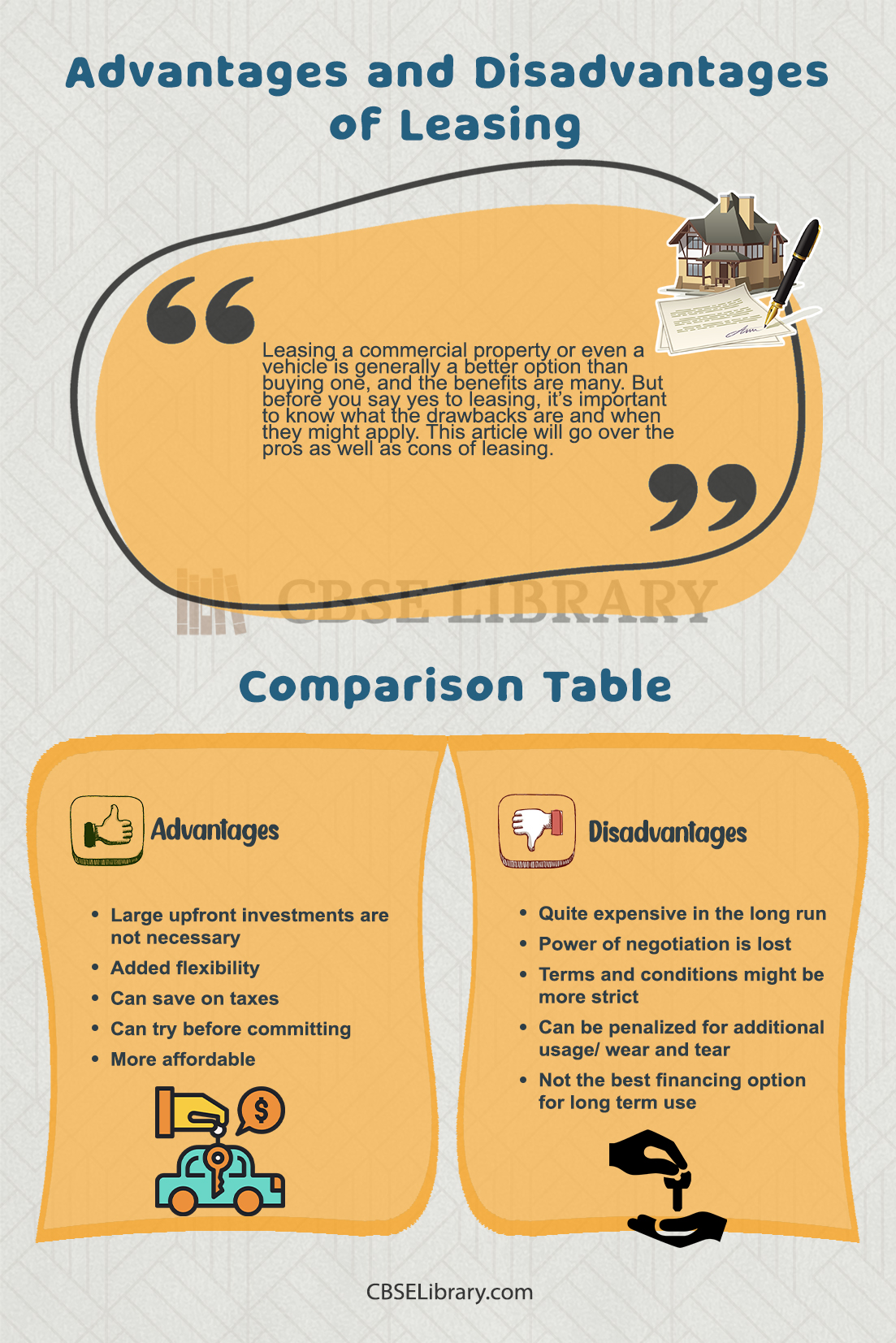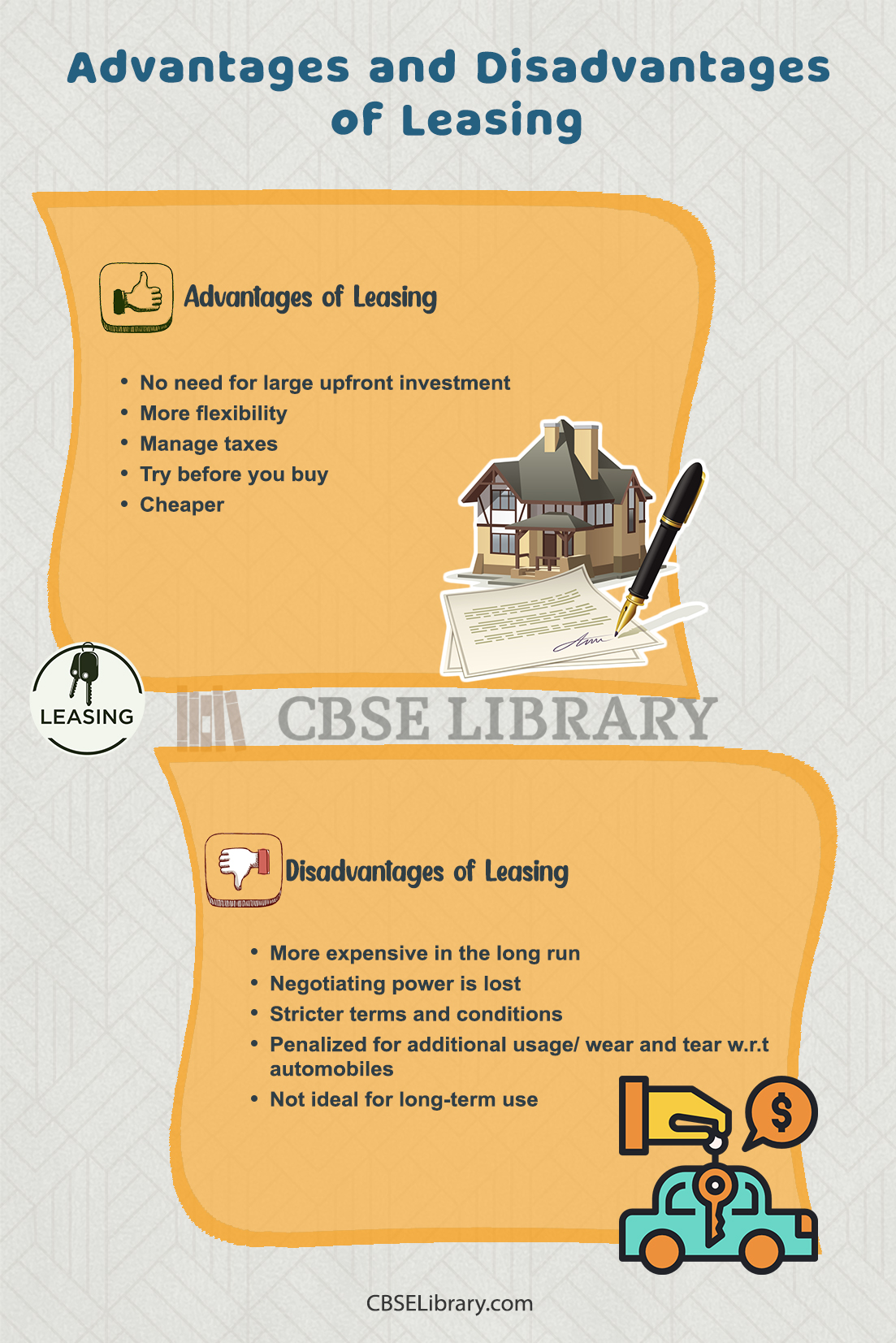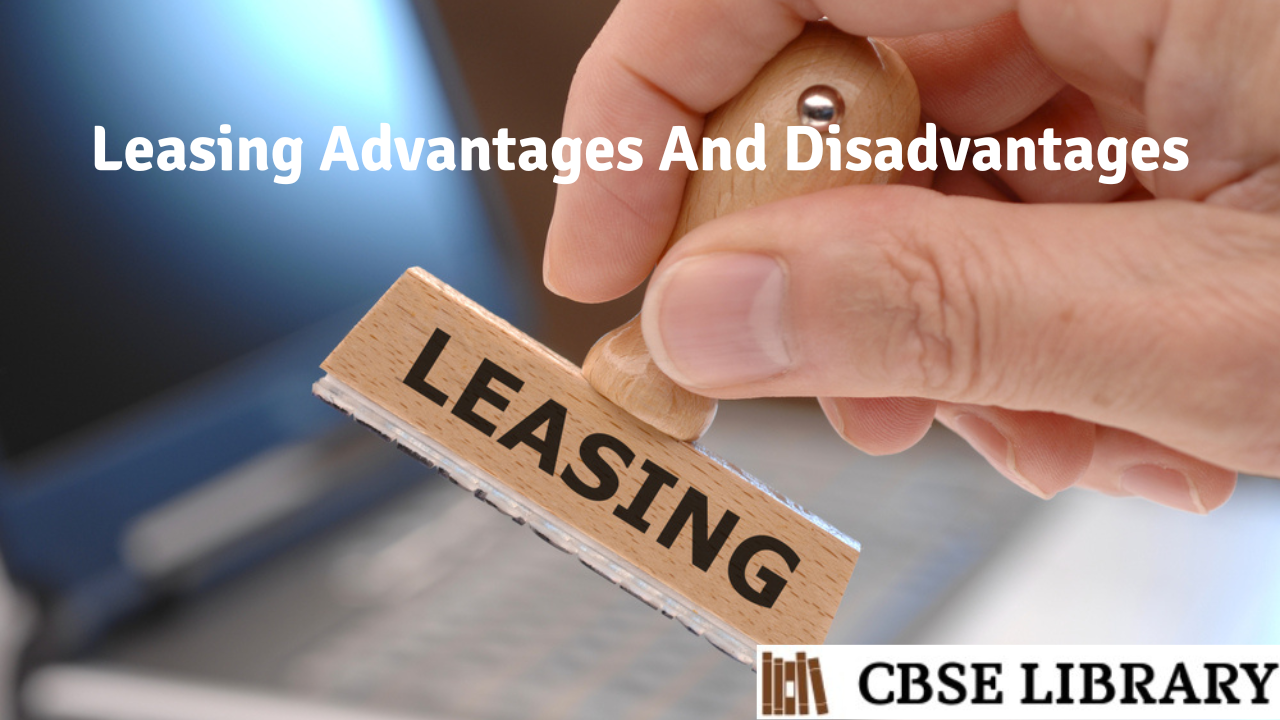Leasing Advantages And Disadvantages: Leasing a commercial property or even a vehicle is generally a better option than buying one, and the benefits are many. But before you say yes to leasing, it’s important to know what the drawbacks are and when they might apply. This article will go over the pros as well as cons of leasing.
Students can also find more Advantages and Disadvantages articles on events, persons, sports, technology, and many more.
- Advantages of Leasing
- Disadvantages of Leasing
- Comparison Table for Advantages and Disadvantages of Leasing
- Leasing vs Buying
- Conclusion on Leasing – Advantages And Disadvantages
- FAQs on Advantages And Disadvantages of Leasing
Advantages of Leasing
Following are the advantages of leasing:
- No need for large upfront investment – There are many advantages to leasing that make it an attractive option for businesses and individuals. The most obvious advantage is that leasing allows you to acquire equipment or vehicles without having to make a large upfront investment. This can free up cash flow and allow you to invest elsewhere.
- More flexibility – Leasing also has the advantage of giving you more flexibility than owning outright. For example, you can choose to lease for a shorter term if you anticipate needing to upgrade your equipment soon. Or, if your business is growing quickly, you can opt for a longer-term lease to get lower monthly payments.
- Manage taxes – Another key advantage of leasing is that it can help you manage your taxes more effectively. When you own equipment outright, you can only deduct the depreciation expense from your taxes. But when you lease, you can deduct both the interest and the depreciation expense, which can save you money come tax time.
- Try before you buy – Finally, leasing gives you the opportunity to try out new equipment or vehicles before committing to buying them outright. This can be very helpful in making sure you’re getting the right product for your business needs.
- Cheaper – If you are leasing a car, it can be less expensive than buying one because you will pay only a fixed monthly or weekly payment. You don’t have to worry about depreciation or repairs, and can trade the car in at any time. You also won’t have to pay much taxes when compared to outright buying a car.
Disadvantages of Leasing
Leasing has many advantages, but it is not without its downsides. Following are a few disadvantages of leasing:
- More expensive in the long run – If you’re considering leasing a car from a dealership, it’s important to be aware of the potential drawbacks. One of the biggest disadvantages of dealership leases is that they can be more expensive in the long run. This is because dealerships typically charge higher interest rates and fees.
- Negotiating power is lost – Another downside to leasing from a dealership is that you may not have as much negotiating power. This is because dealerships typically want you to lease through them so they can make more money off of you. As a result, you may not be able to get the best deal possible.
- Stricter terms and conditions – Also, it’s important to be aware that dealership leases often come with stricter terms and conditions. This means that if you violate the terms of your lease, you could be subject to early termination fees or other penalties.
- Penalized for additional usage/ wear and tear w.r.t automobiles: When you lease a car, the company will set a limited number of miles/kilometers that can be driven each year. This means you’ll be penalized for driving over the set number of miles or kilometers. Additionally, at the end of a lease period, you’ll need to give back the car and start your leasing process all over again.
- Not ideal for long-term use – One of the disadvantages of leasing is that it’s not ideal for someone who intends to own the vehicle after the lease. Leasing is probably best suited for someone who doesn’t intend to own a car at the end of their lease or someone who needs a new car every few years.
Overall, there are both advantages and disadvantages to leasing. If you’re considering this option, make sure you weigh all of the pros and cons before making a decision.

Comparison Table for Advantages and Disadvantages of Leasing
Following are the advantages and disadvantages of Leasing:
| Advantages | Disadvantages |
| Large upfront investments are not necessary | Quite expensive in the long run |
| Added flexibility | Power of negotiation is lost |
| Can save on taxes | Terms and conditions might be more strict |
| Can try before committing | Can be penalized for additional usage/ wear and tear |
| More affordable | Not the best financing option for long term use |
Leasing vs Buying
There are pros and cons to both leasing and buying. It’s important to know the difference between the two before making a decision. Here are some things to remember when making your decision:
Leasing:
- You may be able to get a lower monthly payment than if you were to purchase the car outright.
- You may be able to drive a nicer, newer car than you would be able to afford if you were to buy it outright.
- Leases typically last 2-3 years, so you will have to turn in the car or start a new lease once it’s up.
- If you exceed the mileage limits or damage the car, you may have to pay fees.
- You don’t own the car at the end of the lease, so you will have to start from scratch if you want to lease again.
Buying:
- You will own the car at the end of the loan, so you can do what you want with it (sell it, trade it in, etc.).
- The upfront costs will be higher.

Conclusion on Leasing – Advantages And Disadvantages
Ultimately, it is a decision that comes down to what you need and want. For instance, if you need a car for work or school, then leasing may be the best option for you. However, if you are looking for a car to keep long-term, then buying may be the better route. Similarly, if you are considering leasing a house for the short term, its feasibility might depend on your preferences. Consider your needs and wants before making a decision and consult a leasing agent if you require more input.
FAQs on Advantages And Disadvantages of Leasing
Question 1.
What is leasing?
Answer:
Leasing is when a person pays a certain amount of money for the use of an item. The person then typically has to return the item at the end of the leasing time (typically a year). A traditional lease agreement will usually have terms that require monthly payments, and sometimes even periodic payments such as quarterly payments.
Question 2.
What are the advantages and disadvantages of leasing?
Answer:
Leasing is a good way to get a new car, building or any product without the hassle of saving up for it. However, you will end up paying more in the long run because leasing usually has high lease rates and fees. In addition, if you have bad credit, you may have to pay an upfront deposit. Another important thing to note is that you do not actually own the item, you just pay for using it.
Question 3.
Why is leasing important?
Answer:
With respect to the automobile industry, leasing a vehicle is a great option for those who may only be looking to buy a car for a few years. Leasing can be more affordable than paying the full price of the car, when you consider the difference in interest rates and depreciation. A lease contract will specify how much you pay each month, as well as what happens at the end of your contract. Leasing also lets you choose from many different models without having to worry about down payments or complicated loans.
